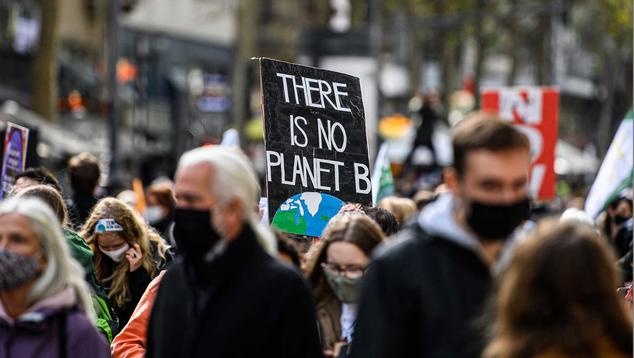This is the first in a series of blogs featuring key findings from the new Lloyd's Register Foundation World Risk Poll report.
Climate scientists almost unanimously agree that climate change is a serious threat to people and is associated with human activities. While the severity of the problem will affect people in various countries differently, the new Lloyd's Register Foundation World Risk Poll finds that the majority of people globally believe climate change poses a threat to the next generation in their countries.
More than four in 10 (41%) people interviewed for the global risk survey in 2019 said that climate change poses a "very serious" threat to people in their countries in the next 20 years, and another 28% said it poses a "somewhat serious" threat. About one in eight (13%) said it was "not a threat at all."
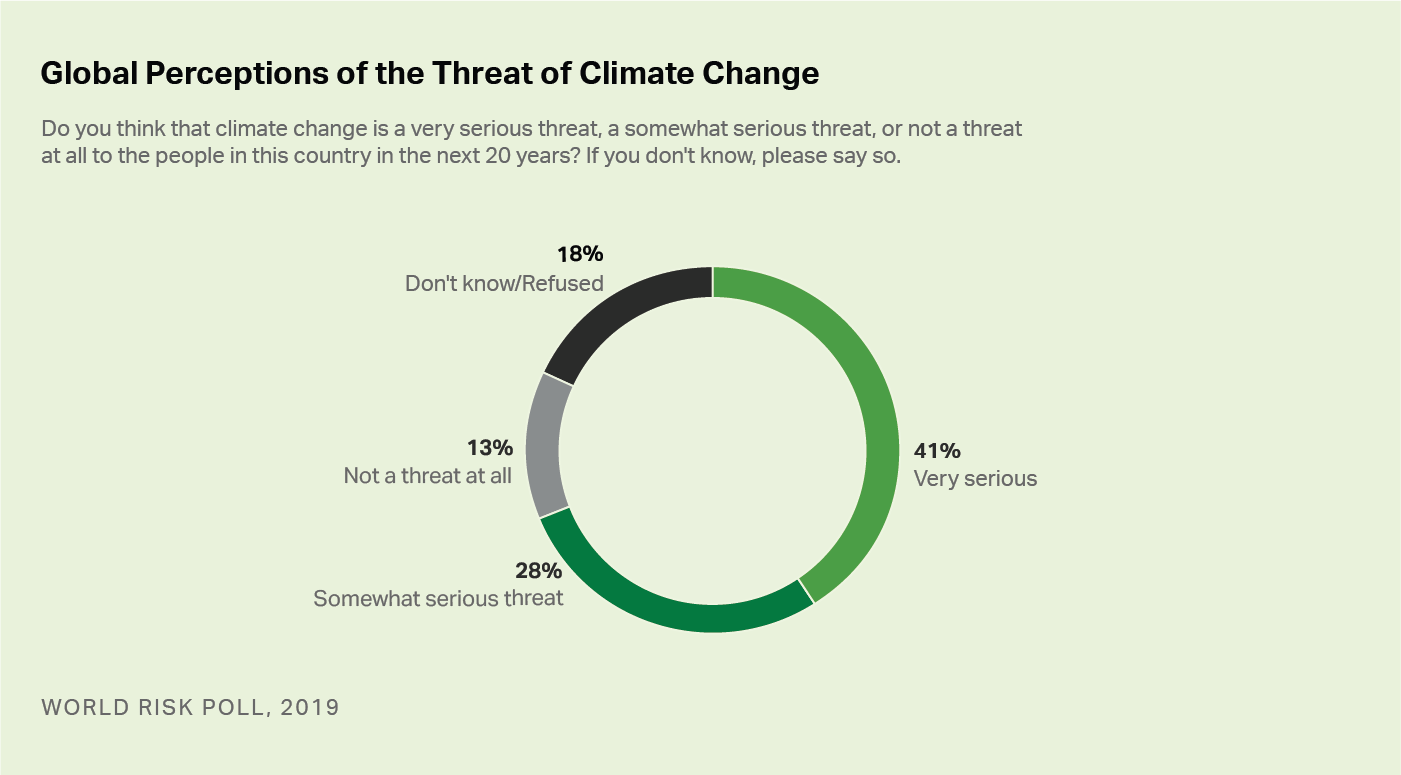
Circle chart. This shows the perceived threat that people worldwide perceive from climate change in the next 20 years. The majority of people worldwide said that climate change would be a very serious or somewhat serious threat to people in their countries in the next 20 years.
The World Risk Poll, the first global study of worry and risk, provides a global snapshot of people's perceptions of the threat that climate change and other risks pose to their countries and themselves. Overall, the survey of more than 154,000 adults in 142 countries and territories conducted throughout 2019 paints a picture of the universal experiences of risk worldwide.
Majorities in Every Region of the World Perceive Some Threat
While views of climate change as a very serious threat varied widely across regions, most people -- at least 60% -- in every region said climate change is a somewhat serious or very serious threat to people in their country in the next 20 years. People in Southern Europe and the Latin America and Caribbean region were the most likely to say climate change is a very serious threat to people in their countries, with more than seven in 10 people (73% and 71%, respectively) expressing this opinion in each region.
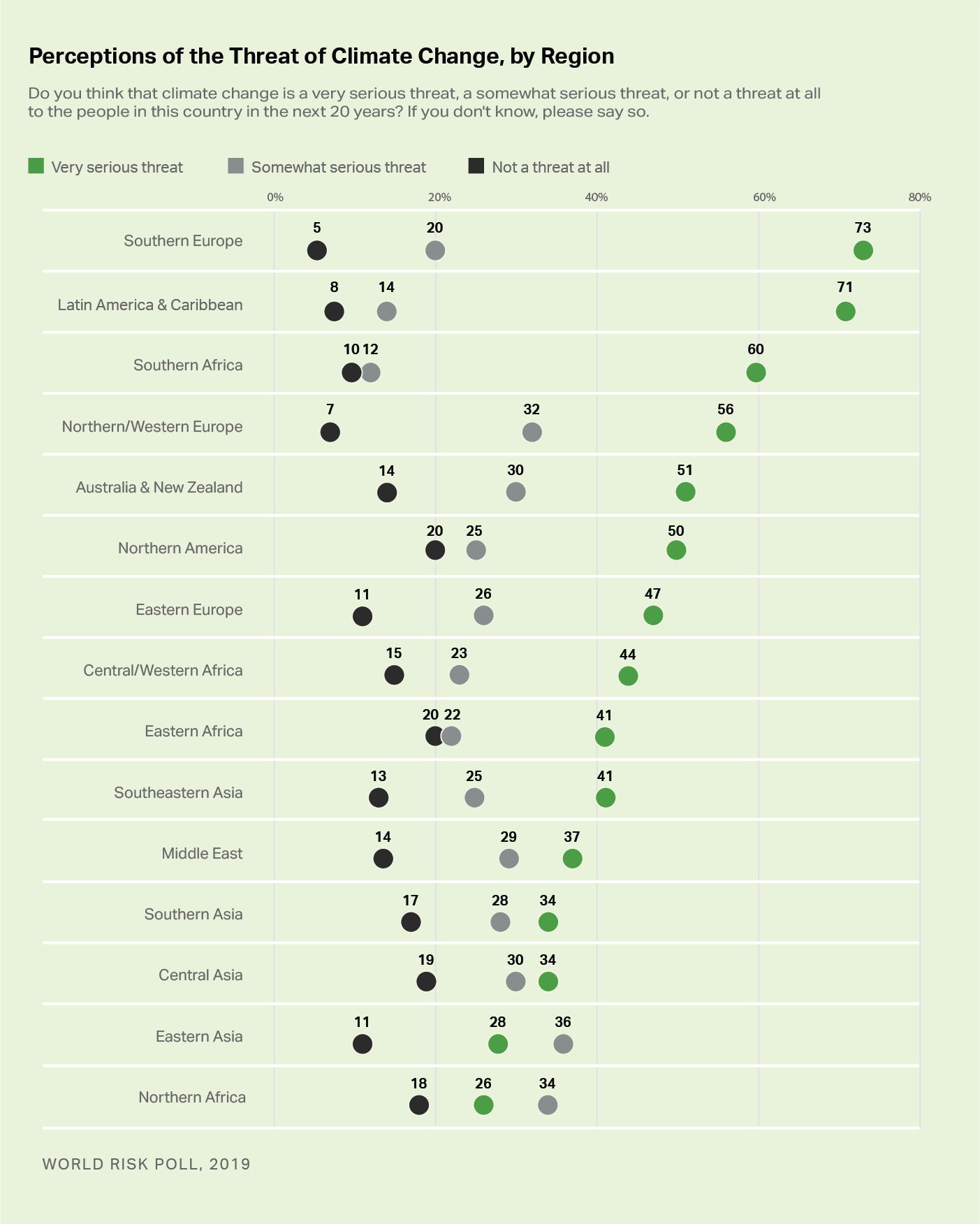
Chart. This shows the perceived threat that people worldwide perceive from climate change in the next 20 years across all major global subregions. The majority of people in each region said that climate change would be a very serious or somewhat serious threat to people in their countries in the next 20 years.
Education, Gender Shape Attitudes Toward Climate Change Risk
A multitude of factors, including education and gender, help shape attitudes toward climate change. But none more so than education. More than half (54%) of people with 16 or more years of education said they thought climate change is a very serious threat in the next 20 years, compared with nearly one in three (30%) of those with zero to eight years of education.
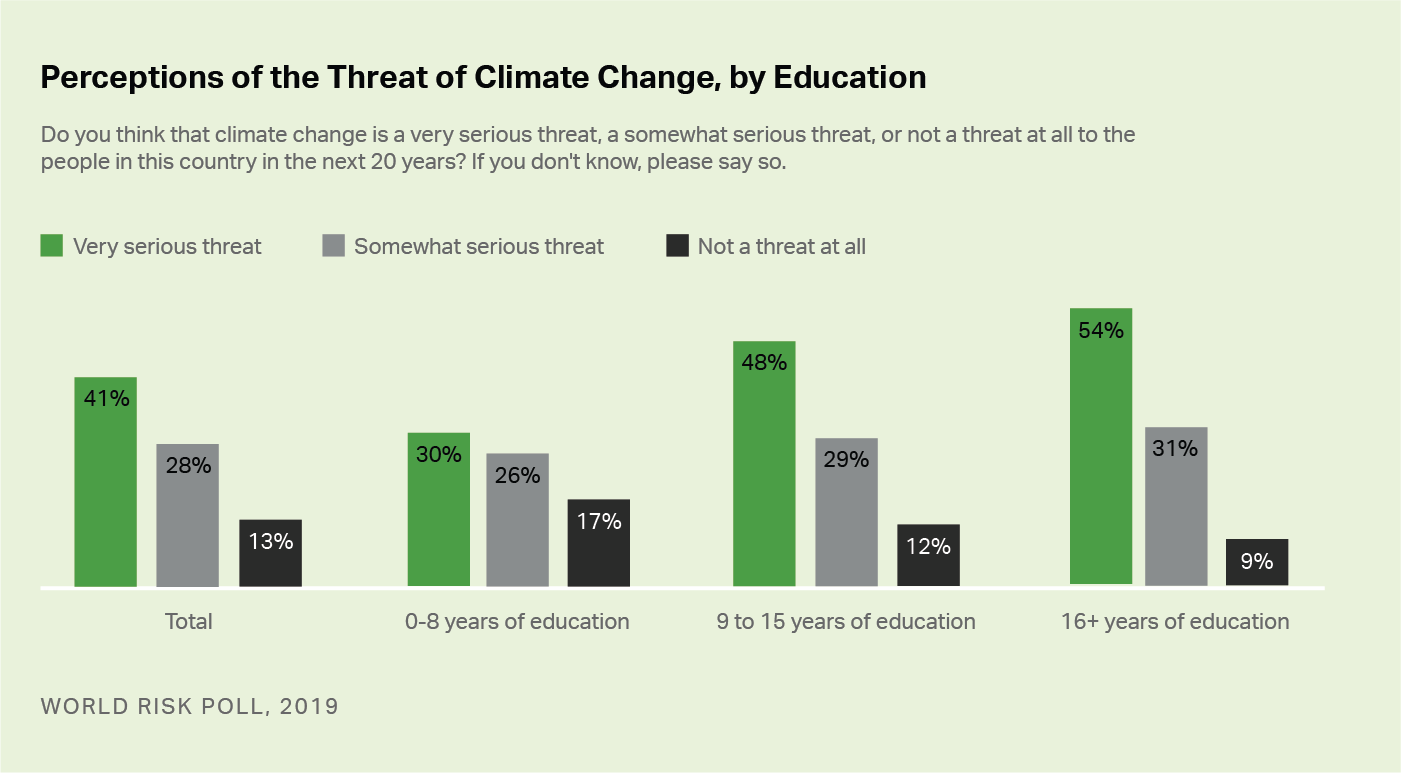
Bar chart. This shows the perceived threat that people worldwide perceive from climate change in the next 20 years by their level of education. The perceived threat from climate change is highest among people with 16 or more years of education.
Men generally viewed climate change less seriously than women. While men and women were about as likely to believe climate change represents a very serious threat to people in their countries in the next 20 years, men were more likely than women to say that climate change is not a threat at all.
However, these gender patterns varied by region. In Northern America, Europe and Australia/New Zealand, more women than men said climate change is a very serious threat to the next generation in their countries. In most other regions, more men than women said this. One exception was the Middle East, where equal percentages of men and women indicated climate change is a very serious threat to people in that time frame.
Top Carbon Emitters and Oil Producers More Skeptical
According to the International Energy Agency, the U.S. is the second-biggest carbon emitter in the world, behind China. The U.S. had the highest percentage of climate change skeptics among high-income countries; 21% of people in the U.S. viewed climate change as not a threat at all. Still, nearly half (49%) viewed climate change as a very serious threat, and another 24% viewed it as a somewhat serious threat.
Interestingly, people in China appeared less concerned about climate change than those in the U.S., primarily because many people in China did not express an opinion on the matter. Slightly fewer than one in four people (23%) in China thought climate change is a very serious threat, 36% said it is a somewhat serious threat, and 12% believed it is not a threat at all. Nearly 30% of people in China said they did not know.
People in India, the world's third-biggest carbon emitter, were roughly as skeptical about climate change as people in the U.S. Nineteen percent of people in India said climate change is not a threat at all, versus 35% who think climate change is a very serious threat.
In four of the top seven oil-producing nations, the U.S., Saudi Arabia, Iraq and the United Arab Emirates, at least one in five of the population stated that climate change posed "no threat," placing them within the top 20 most skeptical countries across the world.
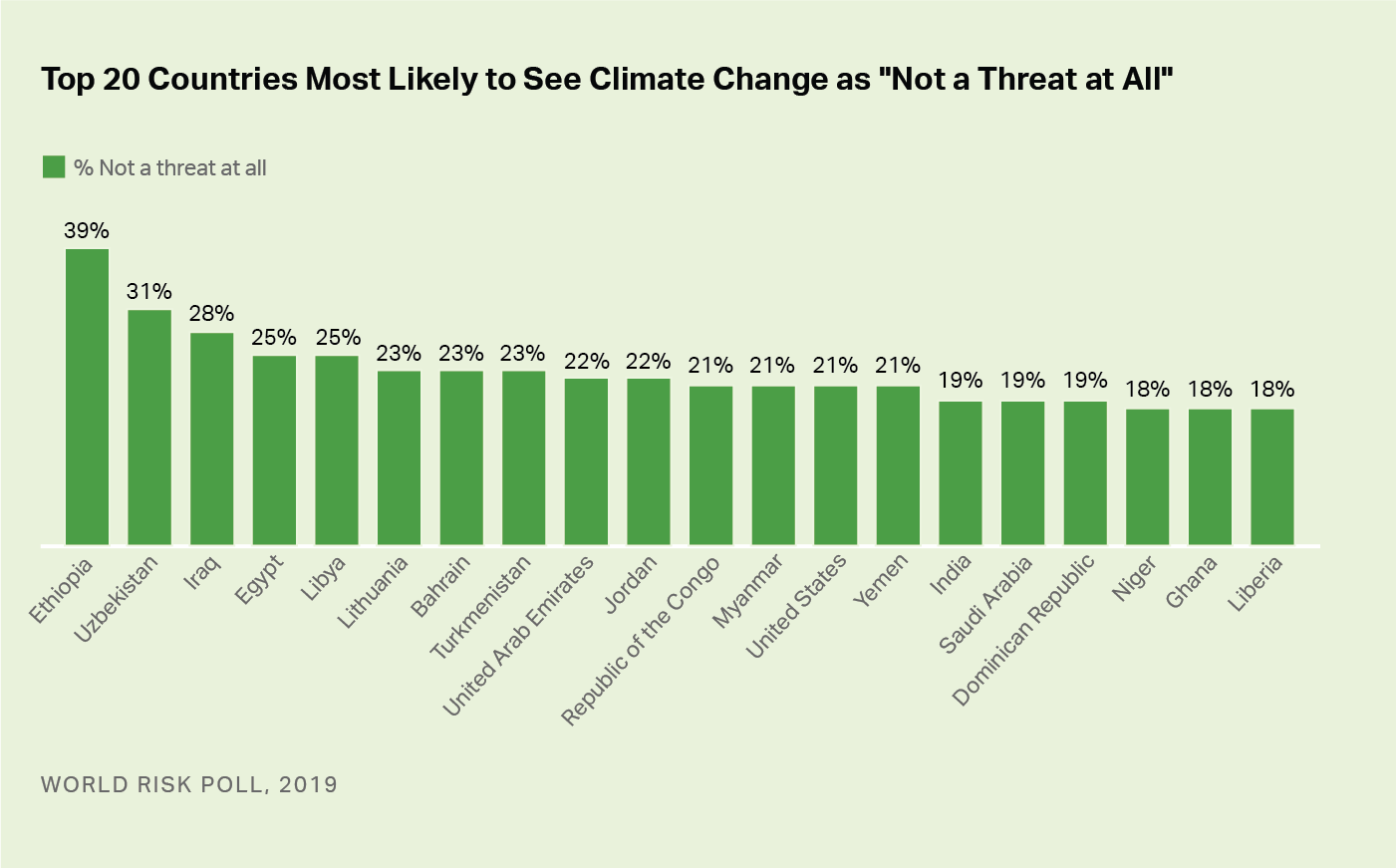
Bar graph. This graph shows the top countries where people are most likely to say that climate change is not a threat at all to people in their countries over the next 20 years.
No Answer on Climate Change
Paralleling a study Gallup undertook in 2009, Gallup found more than 1 billion adults (18% of the global adult population) unable or unwilling to express their view about the potential effect of climate change. Although this represents a smaller figure than in previous years, the top 20 list largely consists of low- and middle-income countries. These include several that are likely to be disproportionately affected by the effects of climate change, such as Bangladesh, where slightly more than one-third of the population did not provide a response to the question.
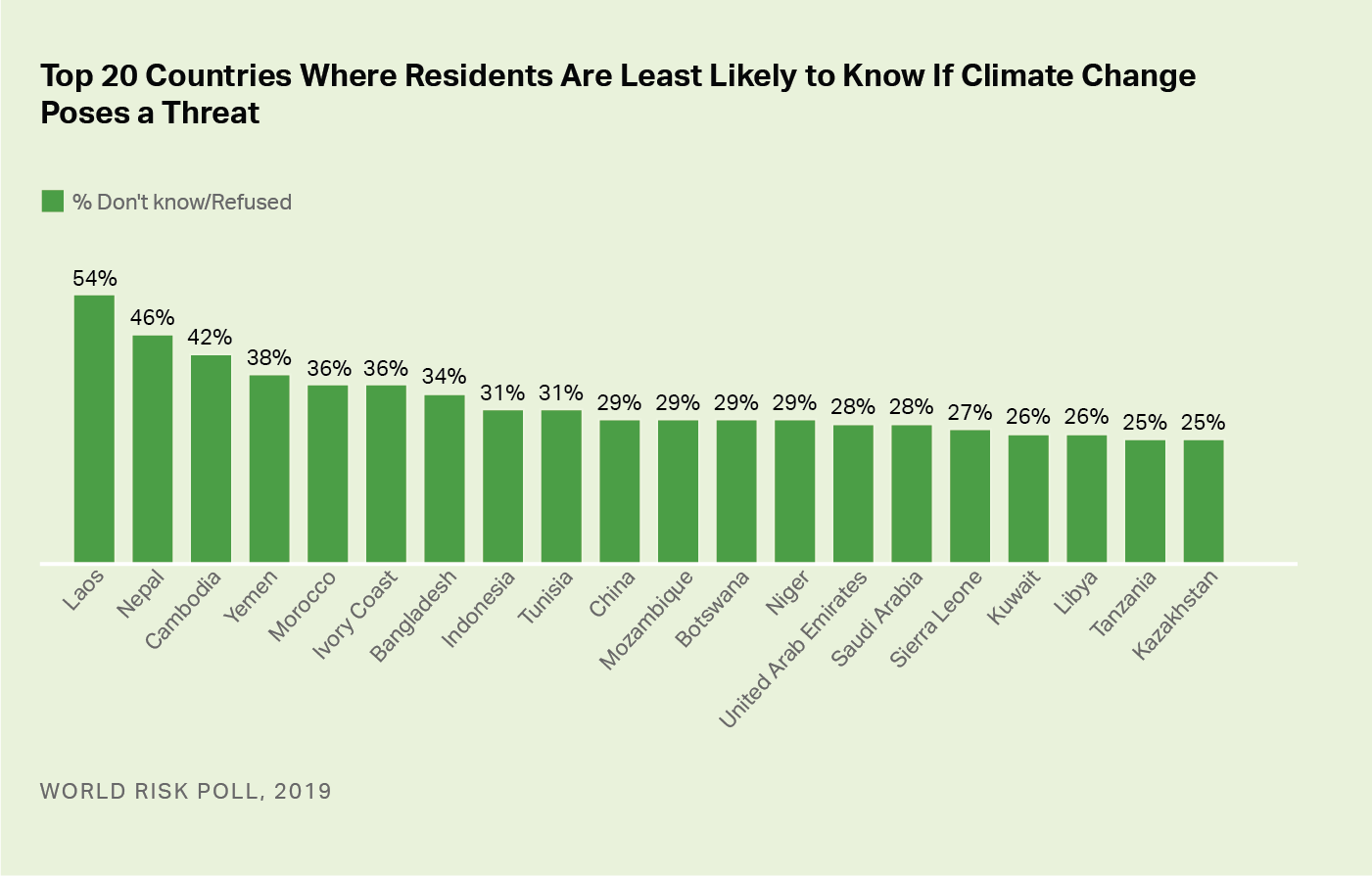
Bar graph. This graph shows the top countries where people are most likely to say they do not know or refused to answer the question about whether climate change poses a threat to their countries over the next 20 years.
Implications
Efforts to address climate change will be aided by understanding how people across the world think and feel about the risks of climate change and the factors that contribute to their perceptions. While the World Risk Poll findings suggest that the efforts to communicate the risks from climate change are being understood, a significant proportion of people remain skeptical or have no opinion on the issue. Therefore, to further raise public awareness of climate change risks to health and livelihoods globally and for each country, scientists and others can use the World Risk Poll results to support their engagement with different communities, recognizing the differences between different demographic groups in society.
Read more about how the world views risk in Lloyd's Register Foundation World Risk Poll report.
Andrew Rzepa is a Partner at Gallup.
Julie Ray is a writer and editor for Gallup.
